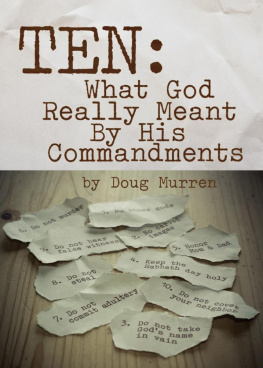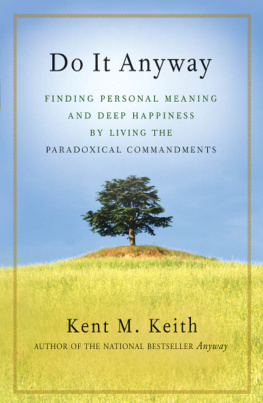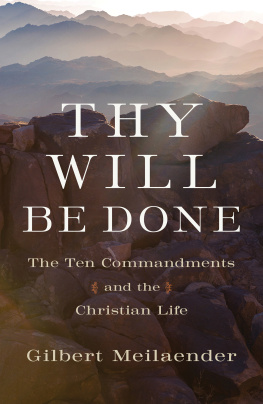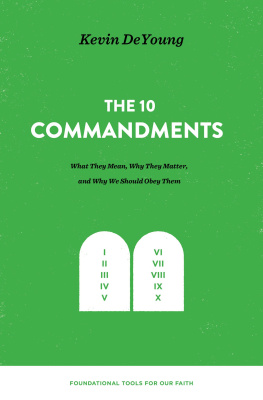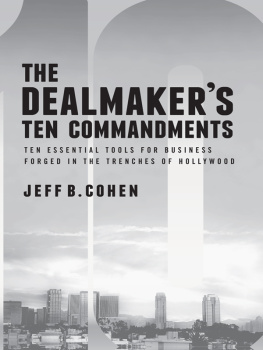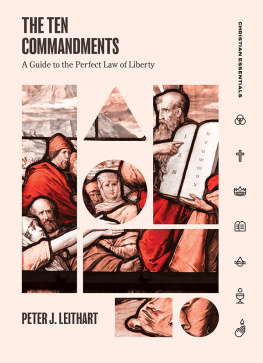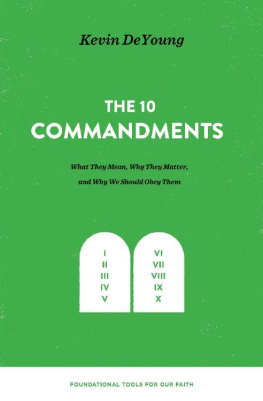

SCRIBNER
A Division of Simon & Schuster, Inc.
1230 Avenue of the Americas
New York, NY 10020
www.SimonandSchuster.com
Copyright 2010 by David Hazony
All rights reserved, including the right to reproduce this book or portions thereof
in any form whatsoever. For information, address Scribner Subsidiary Rights Department,
1230 Avenue of the Americas, New York, NY 10020.
First Scribner hardcover edition September 2010
SCRIBNER and design are registered trademarks of The Gale Group, Inc.,
used under license by Simon & Schuster, Inc., the publisher of this work.
For information about special discounts for bulk purchases,
please contact Simon & Schuster Special Sales at 1-866-506-1949
or business@simonandschuster.com.
The Simon & Schuster Speakers Bureau can bring authors to your live event.
For more information or to book an event contact the Simon & Schuster Speakers Bureau
at 1-866-248-3049 or visit our website at www.simonspeakers.com.
DESIGNED BY ERICH HOBBING
Manufactured in the United States of America
1 3 5 7 9 10 8 6 4 2
Library of Congress Control Number: 2009043129
ISBN 978-1-4165-6235-1
ISBN 978-1-4165-6251-1 (ebook)
For Aba and Ima
Both the tablets and the shattered tablets
were laid in the Ark.
BABYLONIAN TALMUD, MENAHOT 99A
CONTENTS
The Ten
Commandments
THE TEN
COMMANDMENTS
(EXODUS 20:214)
I am the Lord your God who took you out of Egypt, from the house of slaves.
You shall have no other gods besides me. You shall not make for yourself a carved idol, or any likeness of any thing that is in heaven above, or that is in the earth below, or that is in the water under the earth. You shall not bow down to them, nor serve them. For I the Lord your God am a jealous god, punishing the iniquity of the fathers upon the children unto the third and fourth generations of those that hate me, but showing mercy to thousands of generations of those that love me, and keep my commandments.
You shall not invoke the name of the Lord your God in vain. For the Lord shall not hold blameless one who invokes his name in vain.
Remember the Sabbath day, to sanctify it. Six days you shall labor, and complete all your work. But the seventh will be a Sabbath for the Lord your God. You shall do no work: Neither you, nor your son or your daughter, your man-servant or your maid-servant, your beasts or your stranger in your gates. For in six days the Lord made the heavens, the earth, and the sea, and all that is in them, and he rested on the seventh day. For this reason did the Lord bless the seventh day and sanctify it.
Honor your father and your mother, that you may lengthen your days on the land which the Lord your God has given you.
You shall not murder.
You shall not commit adultery.
You shall not steal.
You shall not bear false witness against your neighbor.
You shall not covet your neighbors house. You shall not covet your neighbors wife, nor his man-servant or his maid-servant, his ox or his ass, or anything that is your neighbors.
INTRODUCTION
Can You Name All Ten?
This book is the product not only of years of exploration of the Bible and the ancient rabbinic teachings, but also of my own failures, triumphs, and lessons learned. Like many of us, I have struggled with a career and the unique pressures of modern life; have loved and failed at love; have endured a complicated childhood and raised children of my own; have lived as both a devoutly religious man and a complete secularist; have struggled to deepen myself spiritually, intellectually, and culturally; have seen war and terrorism and social decay from fairly close up; and have broken one or another of the Ten Commandments too many times. My life has been interesting but far from perfect. I do not presume to preach.
The purpose of this book is not to tell you about all the riches and goodness that come from abandoning our worldly concerns and embracing the Ten Commandments as a simple, divine answer to everything. It is, rather, to share with you my own thoughts about the Hebrew Bible, or Old Testament, and the sense that it has been deeply misunderstood in our world.
My main claim is that the Old Testaments centerpiece, the Ten Commandments, is neither an archaic remnant of a dead past nor an arbitrary set of laws handed down to a hundred generations of hungry supplicants and rebellious fools. The commandments represent, rather, a whole attitude to life, one that recognizes both the weaknesses and the unfathomable potential of humanitya worldview that has largely been forgotten but has a great deal to offer every one of us today.
I do believe that the Ten Commandments are a blueprint for a good society, and that a proper understanding of what they were originally meant to communicate can lead all of us, regardless of our faith, to a much better place. But to assert this at the outset is probably saying too much, too soon.
Every few years, the Ten Commandments become a major topic of discussion in the Western world. In America, the most public battleground has been the Supreme Court, which has ruled in a series of cases involving the placement of the Ten Commandments in public displays on government grounds. In one case in 2005, they were put on display, alongside eight classic legal works, at courthouses in two Kentucky counties, where they were meant to represent the states precedent legal code. In a five-to-four decision, the Court ruled that the display violated the First Amendments ban on an establishment of religion and had to be removed. On the same day, the court ruled on a similar case in Texasagain five-to-four, but this time to permit a six-foot-high statue showing the Ten Commandments on the grounds of the Texas State Capitol.
Though the cases were just different enough in the details to allow the Court to come down on different sides, it was clear that on fundamentals, the justices divided into two roughly even campsone allowing the display of the Ten Commandments in government institutions, one against.
What were they arguing about? The debate, it turns out, was not about whether the Ten Commandments were a reli
At the other end was Justice Antonin Scalia, who wrote the dissent in the Kentucky case. In his view, the problem is not that Souter and the other justices misunderstand the Ten Commandments, but that they misunderstand America. To Scalia, America is not like the secular republics of modern-day Europe, where religion is to be strictly excluded from the public forum. From its founding, American government has actively, officially promoted religion in its broadest sense. The inclusion of In God We Trust on the coins, one nation under God in the Pledge of Allegiance, and so help me God at the end of the witness oath in courtall these are consistent with the basic values of a nation that since its birth has believed, with George Washington, that reason and experience both forbid us to expect that national morality can prevail in exclusion of religious principle. What is forbidden, in Scalias view, is not promoting religion but establishing itthat is, creating an official religion that excludes people of other faiths from taking part in American civic life. But to promote a nonspecific, Judeo-Christian faiththis, Scalia argues, is essential to the American experience.
Next page

